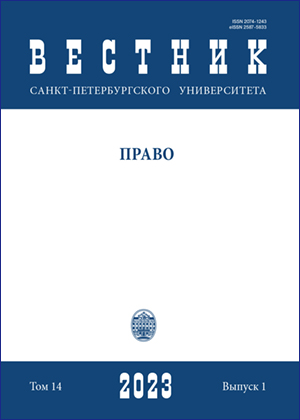Limping relationships in international family law
DOI:
https://doi.org/10.21638/spbu14.2023.113Abstract
The article examines a legal phenomenon that has not received a generalized legal characteristic, its research in international family law is fragmentary. The reasons for the “lame” relationships are analyzed: differences in conflict of laws regulation, incorrect application of conflict of laws rules, discrepancy between substantive regulations, conflict of jurisdictions; it is concluded that “lame” relationships are the result of the interaction of conflict of laws, substantive and procedural norms, leading to an undesirable legal effect. The author expresses doubts about the effectiveness of such a method of eliminating “lame” relationships as the convergence of legal systems, suggesting to pay attention to the competing traditional conflict tools and the opposite methodological approach — recognition, the potential of which is underestimated and insufficiently studied. Recognition is seen not as an alternative to conflict method, but as an additional way to overcome “lame” relationships. Replacement of national conflict of laws rules in cross-border family disputes is illustrated by the practice of the European Court of Human Rights and the Court of Justice of the European Union. Attention is drawn to the existing models of recognition in common law countries and continental legal tradition, the legal nature and place of the norms of Russian family legislation on recognition are analyzed. иThe mechanism of recognition of foreign administrative procedures and decisions, foreign documents in the Russian Federation is assessed. The author comes to the conclusion that implementation in domestic law of various approaches to the recognition of foreign court decisions, administrative procedures and documents issued by the competent authorities of foreign states, proposing to unify them within the framework of a uniform recognition procedure that excludes uncertainty and internal contradictions.
Keywords:
conflict of laws, unification, recognition, legalization, status, private international law
Downloads
References
Downloads
Published
How to Cite
Issue
Section
License
Articles of "Vestnik of Saint Petersburg University. Law" are open access distributed under the terms of the License Agreement with Saint Petersburg State University, which permits to the authors unrestricted distribution and self-archiving free of charge.






